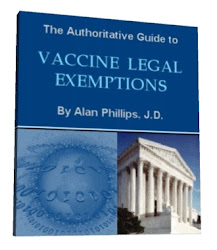(NaturalBlaze by The World Mercury Project Team) Download and print our flu vaccine brochure. Share with your family, friends, doctors and community leaders.
Visit this flu vaccine web page. It’s full of flu facts to help you make informed decisions about your family’s healthcare.
You want to do everything right for your child, and would never knowingly allow someone to inject a neurotoxin into your infant. Before getting a flu shot, you need to know this: MERCURY is a NEUROTOXIN.
Related: Doctors Against Vaccines – Hear From Those Who Have Done the Research
What You Need to Know
The Food and Drug Administration (FDA) warns pregnant women and young children not to eat fish containing high levels of methylmercury. Yet the Centers for Disease Control and Prevention (CDC) recommends pregnant women and infants get influenza vaccines, many of which contain ethylmercury from the preservative thimerosal. Receiving them may result in mercury exposures exceeding the Environmental Protection Agency (EPA) recommended maximum levels.
World Mercury Project is deeply concerned that the risks of getting mercury-containing seasonal influenza vaccines may outweigh the benefits for pregnant women, infants and children. Mercury is known to be highly toxic to brain tissue and can impact critical stages of brain development.
A 2017 CDC study links miscarriage to flu vaccines, particularly in the first trimester. Pregnant women vaccinated in the 2010/2011 and 2011/2012 flu seasons had two times greater odds of having a miscarriage within 28 days of receiving the vaccine. In women who had received the H1N1 vaccine in the previous flu season, the odds of having a miscarriage within 28 days were 7.7 times greater than in women who did not receive a flu shot during their pregnancy.
A study published in 2016 that looked at the safety of flu vaccines found a moderately elevated risk for major birth defects in infants born to women who had received a flu vaccine during the first trimester of pregnancy. A study published in 2017 found an elevated risk of autism spectrum disorders in children whose mothers had a first trimester flu shot.
Related: How To Detoxify and Heal From Vaccinations – For Adults and Children
Flu vaccine administration is documented to cause an inflammatory response in pregnant women. Recent research found inflammation during pregnancy is associated with the development of autism spectrum disorders.
A large study in approximately 50,000 pregnant women over five flu seasons found no difference in the risk for developing influenza or similar illnesses between those who received the influenza vaccine during pregnancy and those who did not.
An independent 2014 review found no randomized controlled trials assessing vaccination in pregnant women. It states, “The only evidence available comes from observational studies with modest methodological quality. On this basis, vaccination shows very limited effects.”
Know the Facts
- In 2004, the Environmental Protection Agency (EPA) estimated that one in every six women has mercury blood levels that could pose a risk to an unborn child.
- Mercury rapidly crosses the placenta and accumulates in the fetus at higher levels than in the mother. Two studies in 2012 showed that a mother’s mercury exposure is linked to attention problems in her children.
- Scientific studies have documented that ethylmercury used in vaccines crosses into the infant brain and could impact critical stages of brain development.
- It is inconsistent to recommend vaccines containing ethylmercury when also counseling pregnant women to avoid seafood high in methylmercury due to the known harmful effects mercury can have on the developing fetus.
- Thimerosal-containing flu vaccines contain 250 times the mercury level the EPA uses to classify hazardous waste. Unused thimerosal-containing flu vaccineshould be returned to the manufacturer for appropriate disposal.
2017-2018 Flu Vaccines
TABLE 1. Influenza vaccines — United States, 2017–18 influenza season*
| Trade name | Manufacturer | Presentation | Age Indication | Mercury (from thimerosal, µg/0.5 mL) |
|---|---|---|---|---|
| Inactivated influenza vaccines, quadrivalent (IIV4s), standard-dose | ||||
| Afluria Quadrivalent | Seqirus | 0.5 mL prefilled syringe | ≥18 years | NR |
| 5.0 mL multidose vial | ≥18 years (by needle/syringe) | 24.5 | ||
| 18 through 64 years (by jet injector) | ||||
| Fluarix Quadrivalent | GlaxoSmithKline | 0.5 mL prefilled syringe | ≥3 years | NR |
| FluLaval Quadrivalent | ID Biomedical Corp. of Quebec (distributed by GlaxoSmithKline) | 0.5 mL prefilled syringe | ≥6 months | NR |
| 5.0 mL multidose vial | ≥6 months | <25 | ||
| Fluzone Quadrivalent | Sanofi Pasteur | 0.25 mL prefilled syringe | 6 through 35 months | NR |
| 0.5 mL prefilled syringe | ≥3 years | NR | ||
| 0.5 mL single-dose vial | ≥3 years | NR | ||
| 5.0 mL multidose vial | ≥6 months | 25 | ||
| Inactivated influenza vaccine, quadrivalent (ccIIV4), standard-dose,† cell culture-based | ||||
| Flucelvax Quadrivalent | Seqirus | 0.5 mL prefilled syringe | ≥4 years | NR |
| 5.0 mL multidose vial | ≥4 years | 25 | ||
| Inactivated influenza vaccine, quadrivalent (IIV4), standard-dose, intradermal | ||||
| Fluzone Intradermal Quadrivalent | Sanofi Pasteur | 0.1 mL single-dose prefilled microinjection system | 18 through 64 years | NR |
| Inactivated Influenza Vaccines, trivalent (IIV3s), standard-dose | ||||
| Afluria | Seqirus | 0.5 mL prefilled syringe | ≥5 years | NR |
| 5.0 mL multidose vial | ≥5 years (by needle/syringe) | 24.5 | ||
| 18 through 64 years (by jet injector) | ||||
| Fluvirin | Seqirus | 0.5 mL prefilled syringe | ≥4 years | ≤1 |
| 5.0 mL multidose vial | ≥4 years | 25 | ||
| Adjuvanted inactivated influenza vaccine, trivalent (aIIV3), standard-dose | ||||
| Fluad | Seqirus | 0.5 mL prefilled syringe | ≥65 years | NR |
| Inactivated Influenza Vaccine, trivalent (IIV3), high-dose | ||||
| Fluzone High-Dose | Sanofi Pasteur | 0.5 mL prefilled syringe | ≥65 years | NR |
| Recombinant Influenza Vaccine, quadrivalent (RIV4) | ||||
| Flublok Quadrivalent | Protein Sciences | 0.5 mL prefilled syringe | ≥18 years | NR |
| Recombinant Influenza Vaccine, trivalent (RIV3) | ||||
| Flublok | Protein Sciences | 0.5 mL single-dose vial | ≥18 years | NR |
*NR = not relevant (does not contain thimerosal).
If You Are Pregnant or Have Small Children . . .
- If you decide to vaccinate, insist on mercury–free influenza vaccines for yourself and your children and do not get a flu vaccine the same day as other vaccines.
- Do not let yourself be pressured into receiving a vaccine that you don’t want; should you choose to vaccinate, insist that your doctor or pharmacist find you a mercury-free vaccine.
- If mercury-free vaccines are unavailable, look at the evidence and decide if the influenza virus is a significant concern for your family.
- Also, consider the evidence regarding the effectiveness of the flu vaccine in actually preventing influenza. For information visit www.summaries.cochrane.org
More Vaccine Facts to Know…
All vaccines, with or without mercury, pose health risks. However, the influenza vaccine is of great concern, as many brands contain high levels of mercury in their multi-dose vials. Be sure to read package inserts for any vaccine prior to getting vaccinated.
 According to flu vaccine package inserts, “Safety and effectiveness has not been established in pregnant women or nursing mothers and should only be given to a pregnant woman if clearly needed.”
According to flu vaccine package inserts, “Safety and effectiveness has not been established in pregnant women or nursing mothers and should only be given to a pregnant woman if clearly needed.”
A study that compared children who received flu vaccine to those who did not found no significant difference in the rate of influenza between the active and placebo groups. It also found that the group of children who received the flu vaccine had a 4.4 times relative risk of non-influenza respiratory tract infections.
An Australian study found one in every 110 children under the age of 5 had convulsions following vaccination with the FLUVAX H1N1 vaccine in 2009. Additional research found a spike in cases of narcolepsy in children associated with the H1N1 vaccine.
A review in the medical journal The Lancet found a lack of health benefits from influenza vaccine in children under two along with significantly increased rates of vaccine-related adverse events.
Tips for Preventing the Flu
Simple techniques such as avoiding those with flu-like illnesses, eating a healthy diet and good hand washing can prevent many cases of flu. If you do contract influenza, optimizing vitamin D levels, fluid intake and rest can boost immune function.
For complete list of references, articles on flu vaccines and more, please visit our website at www.worldmercuryproject.org/flufacts
Sign up for free news and updates from Robert F. Kennedy, Jr. and the World Mercury Project. Your donation will help to support us in our efforts.
Related Reading:
- How To Detoxify and Heal From Vaccinations – For Adults and Children
- Doctors Against Vaccines – Hear From Those Who Have Done the Research
- Nurses Against Vaccines
- Celebrities Who Have Spoken Out Against Vaccines
- Statesmen Against Mandatory Vaccines
- Scientists Against Vaccines – Hear From Those Who Have Done the Research
